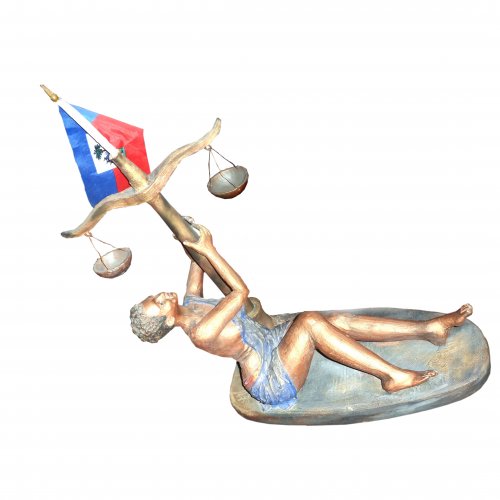Best Employment & Labor Lawyers in Port-au-Prince
Share your needs with us, get contacted by law firms.
Free. Takes 2 min.
List of the best lawyers in Port-au-Prince, Haiti
About Employment & Labor Law in Port-au-Prince, Haiti
Employment and Labor law in Port-au-Prince, Haiti, encompasses the regulation of relationships between employers and employees. These laws are designed to ensure fair treatment in the workplace, provide minimum employment standards, and protect the rights of workers. Key areas include employment contracts, wages, working conditions, and employee benefits. In Haiti, labor laws aim to address employment discrimination, workplace safety, and other issues that may arise between employers and employees.
Why You May Need a Lawyer
You may need a lawyer in the field of Employment & Labor when facing a range of issues, such as workplace discrimination, harassment, wrongful termination, wage disputes, or contract disagreements. Legal assistance can also be crucial when navigating complex employment contracts, understanding your rights as an employee or employer, or handling disputes through mediation or litigation. A lawyer can provide guidance to ensure compliance with local employment laws and protect your interests.
Local Laws Overview
Several key aspects of local employment and labor laws are particularly relevant in Port-au-Prince, Haiti. These include laws regulating minimum wage, working hours and overtime, employee leave entitlements, and workplace health and safety standards. Additionally, laws concerning termination of employment, employee benefits, and collective bargaining are significant. Understanding these regulations is crucial for employers and employees to maintain lawful and prosperous work environments.
Frequently Asked Questions
What is the minimum wage in Port-au-Prince, Haiti?
The minimum wage in Port-au-Prince varies depending on the industry and job category. It is important to consult the latest decrees or seek legal advice for accurate information.
What should I do if I experience workplace discrimination?
It is advisable to document the incidents, report them to a supervisor or HR, and consult with a legal professional who can advise you on your rights and possible actions.
How are employee termination disputes handled?
Termination disputes can be handled through negotiation, mediation, or legal proceedings. It is important to understand the reasons for termination and whether they comply with local labor laws.
Are there specific laws regarding workplace safety?
Yes, Haitian labor law includes regulations on workplace health and safety to ensure a safe working environment for all employees. Employers are required to adhere to these standards to prevent workplace injuries and accidents.
Can I negotiate my employment contract?
Yes, both employees and employers have the right to negotiate the terms of employment contracts, including salary, benefits, and working conditions. Legal advice can help ensure that the terms are fair and lawful.
What recourse do I have if my employer doesn't pay my wages on time?
If an employer fails to pay wages as stipulated, you may file a complaint with the relevant government labor office or seek legal assistance to pursue the matter further.
What rights do I have regarding maternity leave?
Employees are entitled to maternity leave as per local labor laws. It’s important to check the current regulations and employment contract terms regarding leave entitlements.
How can I join or form a labor union?
Workers in Haiti have the right to form or join unions. The process involves organizing with fellow workers and meeting the necessary legal requirements to be formally recognized.
Is overtime payment mandatory?
Yes, employees who work beyond the standard working hours are generally entitled to overtime pay. The specific rates and conditions are subject to current labor laws and employment agreements.
What steps can I take if I'm being harassed at work?
Document incidents of harassment, report them to your employer or HR department, and consider seeking legal assistance to protect your rights and take appropriate action.
Additional Resources
For additional support, you can reach out to local government bodies such as the Ministry of Social Affairs and Labor in Haiti, labor unions, and worker advocacy organizations. These entities can provide information, resources, and assistance related to employment rights and disputes.
Next Steps
If you need legal assistance in Employment & Labor, consider consulting with a labor attorney who specializes in Haitian labor law. Look for legal clinics, law firms, or community organizations offering legal help in Port-au-Prince. Prepare any relevant documents and information related to your case, and clearly communicate your needs and concerns during consultations.
Lawzana helps you find the best lawyers and law firms in Port-au-Prince through a curated and pre-screened list of qualified legal professionals. Our platform offers rankings and detailed profiles of attorneys and law firms, allowing you to compare based on practice areas, including Employment & Labor, experience, and client feedback.
Each profile includes a description of the firm's areas of practice, client reviews, team members and partners, year of establishment, spoken languages, office locations, contact information, social media presence, and any published articles or resources. Most firms on our platform speak English and are experienced in both local and international legal matters.
Get a quote from top-rated law firms in Port-au-Prince, Haiti — quickly, securely, and without unnecessary hassle.
Disclaimer:
The information provided on this page is for general informational purposes only and does not constitute legal advice. While we strive to ensure the accuracy and relevance of the content, legal information may change over time, and interpretations of the law can vary. You should always consult with a qualified legal professional for advice specific to your situation.
We disclaim all liability for actions taken or not taken based on the content of this page. If you believe any information is incorrect or outdated, please contact us, and we will review and update it where appropriate.
Browse employment & labor law firms by service in Port-au-Prince, Haiti
Port-au-Prince, Haiti Attorneys in related practice areas.








